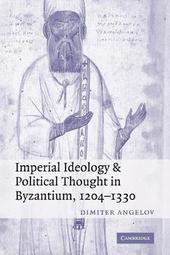
|
Imperial Ideology and Political Thought in Byzantium, 1204-1330
Paperback / softback
Main Details
| Title |
Imperial Ideology and Political Thought in Byzantium, 1204-1330
|
| Authors and Contributors |
By (author) Dimiter Angelov
|
| Physical Properties |
| Format:Paperback / softback | | Pages:474 | | Dimensions(mm): Height 229,Width 152 |
|
| ISBN/Barcode |
9780521294386
|
| Classifications | Dewey:321.030949509022 |
|---|
| Audience | | Professional & Vocational | |
|---|
| Illustrations |
Worked examples or Exercises
|
|
Publishing Details |
| Publisher |
Cambridge University Press
|
| Imprint |
Cambridge University Press
|
| Publication Date |
16 June 2011 |
| Publication Country |
United Kingdom
|
Description
This study is the first to systematically investigate Byzantine imperial ideology, court rhetoric and political thought after the Latin conquest of Constantinople in 1204 - in the Nicaean state (1204-61) and during the early period of the restored empire of the Palaiologoi. The book explores Byzantine political imagination at a time of crisis when the Empire ceased to be a first-rate power in the Mediterranean. It investigates the correspondence and fissures between official political rhetoric, on the one hand, and the political ideas of lay thinkers and churchmen, on the other. Through the analysis of a wide body of sources, a picture of Byzantine political thought emerges which differs significantly from the traditional one. The period saw refreshing developments in court rhetoric and political thought, some with interesting parallels in the medieval and Renaissance West, which arose in response to the new historical realities.
ReviewsReview of the hardback: 'Angelov offers a subtle study of the interplay between official pronouncements about right political order and those ideas about imperial rule that developed in semi-official or independent contexts. To this end, he deploys an astonishing spectrum of sources from a century-and-a-half of Byzantine history, including preambles (prooimia) to imperial charters, orations composed for public performance at the imperial court, mirrors of princes, philosophical treatises and rhetorical exercises.' The Anglo-Hellenic Review
|